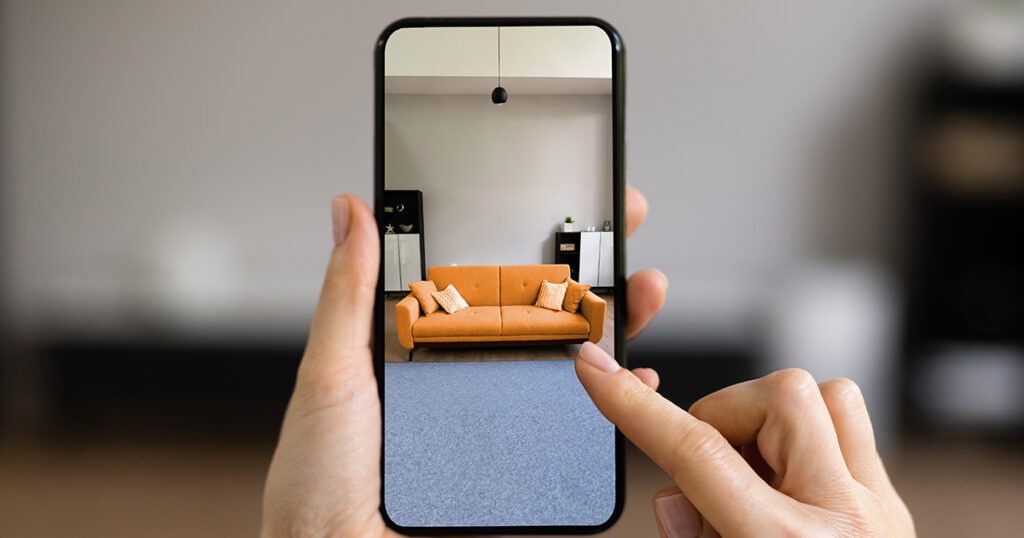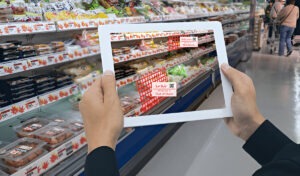Farewell to Dull Ecommerce: Unleashing the Thrills of Augmented Reality!
- Saru
- May 15, 2023

In recent years, the world of ecommerce has undergone a dramatic transformation, with technological advancements revolutionizing the way we shop online. One of the most promising innovations that has captured the attention of both consumers and businesses alike is augmented reality (AR). Augmented reality has the power to bridge the gap between the virtual and physical worlds, offering a truly immersive and interactive shopping experience. In this blog post, we will explore the exciting promise of augmented reality in ecommerce and how it is reshaping the industry.
What is Augmented Reality (AR) in Ecommerce?
Augmented reality is a technology that overlays digital information and virtual objects onto the real-world environment, enhancing the user’s perception and interaction with their surroundings. In the context of ecommerce, AR enables customers to visualize and experience products in a more realistic and personalized way, even when shopping online. By using smartphones, tablets, or specialized AR devices, users can explore virtual products, try them on, and see how they fit or look in their physical space before making a purchase. Here are a few examples:
1. IKEA Place:
IKEA, the well-known furniture retailer, developed the IKEA Place app that utilizes AR to help customers visualize how furniture will look and fit in their homes. Users can select furniture items from IKEA’s catalog and place them virtually in their desired space using their smartphone or tablet camera. They can see how a sofa, table, or lamp will look in their living room, bedroom, or any other area, allowing them to assess the size, style, and overall aesthetic before making a purchase.
2. Warby Parker:
Warby Parker, an eyewear company, offers an AR-based app that allows users to virtually try on glasses before buying them. Customers can use their smartphone or tablet camera to see how different frames will look on their face in real-time. The app accurately maps the glasses to the user’s facial features, enabling them to see how different styles, shapes, and colors suit them. This AR experience enhances the online shopping process and helps users make more confident decisions when selecting eyewear.
3. Sephora Virtual Artist:
Sephora, a popular cosmetics retailer, has developed the Sephora Virtual Artist app that leverages AR to let users try on various makeup products virtually. Customers can use the app’s camera feature to see how different shades of lipstick, eyeshadow, or blush will look on their face in real-time. The app also offers tutorials, product recommendations, and a seamless shopping experience, all within the AR environment.
These examples demonstrate how AR technology has been used to provide users with the ability to virtually try on and visualize products in their physical space, enabling them to make more informed decisions and enhancing the overall shopping experience.
Enhancing Product Visualization and Personalization:
One of the biggest challenges in Online Shopping has always been the inability to physically interact with products before buying them. Augmented reality has the potential to address this limitation by allowing customers to virtually try on clothing, test furniture placement in their homes, or see how a new paint color would look on their walls. This level of interactivity not only enhances the shopping experience but also provides customers with a more accurate representation of the product, reducing the likelihood of disappointment upon delivery.
Redefining the Try-Before-You-Buy Concept:
Traditionally, the “try-before-you-buy” concept was limited to physical stores. However, augmented reality is changing the game by bringing this concept into the digital realm. AR technology allows customers to virtually “try on” makeup, sunglasses, or even hairstyles, eliminating the need to visit a physical store. This not only saves time and effort but also gives shoppers the confidence to make informed purchasing decisions.
Virtual Showrooms and Interactive Product Demonstrations:
Augmented reality enables the creation of virtual showrooms and interactive product demonstrations, providing an immersive experience that rivals the in-store environment. Businesses can showcase their products in a visually engaging way, allowing customers to explore various features, configurations, and customization options. For example, a furniture retailer can create a virtual showroom where customers can arrange and rearrange virtual furniture pieces to find the perfect fit for their living space. Augmented reality (AR) technology has been leveraged by automobile manufacturers to create virtual showrooms and interactive product demonstrations. Here are a couple of examples:
1. Nexa Virtual Showroom by Maruti Suzuki:
Nexa is a premium automotive retail brand by Maruti Suzuki in India. They have developed a virtual showroom experience called the “Nexa Virtual Showroom.” It allows customers to explore and interact with their range of vehicles in a virtual environment. Users can virtually walk around the cars, open doors, view interiors, and even customize the exterior colors and accessories. This immersive experience enables customers to get a feel for the cars and make informed purchase decisions.
2. MG Motor’s AR Showroom:
MG Motor, a global automotive company, has utilized AR technology to create an augmented reality showroom experience. With their AR app, users can place a virtual representation of MG Motor’s cars in their real-world environment using their smartphones or tablets. Customers can walk around the virtual car, open doors, examine interiors, and even interact with various features such as turning on headlights or adjusting the sunroof. This AR showroom allows customers to explore the cars’ details and visualize how they would look in their own surroundings.
These examples showcase how AR technology can enhance the automotive retail experience by providing customers with interactive and immersive ways to explore and customize vehicles without physically visiting a traditional showroom.
AR-powered Customer Support and Education:
AR technology can also be leveraged to enhance customer support and education in ecommerce. Through augmented reality, businesses can offer virtual tutorials, guided installation instructions, or troubleshooting assistance. This not only improves customer satisfaction but also reduces the number of returns and support inquiries, leading to cost savings for businesses.
Boosting Sales and Reducing Returns:
By providing customers with a more immersive and realistic shopping experience, augmented reality has the potential to boost sales and reduce returns. The ability to visualize products in a personalized and contextualized manner increases customer confidence, resulting in higher conversion rates. Moreover, AR can minimize the chances of dissatisfaction due to inaccurate product expectations, ultimately leading to a decrease in return rates.
Augmented reality is revolutionizing the ecommerce industry, transforming the way we shop online. By leveraging AR technology, businesses can enhance product visualization, offer personalized experiences, and provide interactive demonstrations. The immersive nature of augmented reality not only improves customer satisfaction but also drives sales and reduces returns. As AR continues to evolve and become more accessible, we can expect ecommerce to become more engaging, dynamic, and personalized than ever before.
However, AR can be a double-edged sword. If the technology is not used well, it can de-sell a product just as easily as it can sell it. Just imagine AR showing you a piece of furniture in your living room but not in the correct size, you would probably not buy it thinking that it would not fit your space or not look good in that space.
To fully embrace the exciting promise of augmented reality in ecommerce, businesses can turn to innovative platforms like Pluugin. Pluugin is an emerging ecommerce accelerator that specializes in integrating augmented reality solutions into online stores. By partnering with Pluugin, businesses can unlock the full potential of AR technology, offering their customers an unparalleled shopping experience. With Pluugin’s expertise and support, ecommerce businesses can stay ahead of the competition, tap into the power of augmented reality, and revolutionize the way they engage with their customers.
Learn more about Pluugin and how we can help transform your ecommerce store by visiting us at www.globalplugin.com. Say goodbye to boring ecommerce and embrace the exciting future of augmented reality with Pluugin.
You May Also like This
Popular Posts
-
 The Rise of Autonomous Stores: Will eCommerce Replace Traditional Retail Entirely?
The Rise of Autonomous Stores: Will eCommerce Replace Traditional Retail Entirely? -
 SEO for eCommerce: How to Rank Higher and Drive More Organic Sales
SEO for eCommerce: How to Rank Higher and Drive More Organic Sales -
 AI as Your Co-Founder: How Generative AI Is Changing eCommerce Business Models
AI as Your Co-Founder: How Generative AI Is Changing eCommerce Business Models -
 How to Scale Your Fulfillment Operations During Peak Seasons
How to Scale Your Fulfillment Operations During Peak Seasons -
 The Future of Fulfillment: Micro-Warehouses and Hyperlocal Delivery
The Future of Fulfillment: Micro-Warehouses and Hyperlocal Delivery







